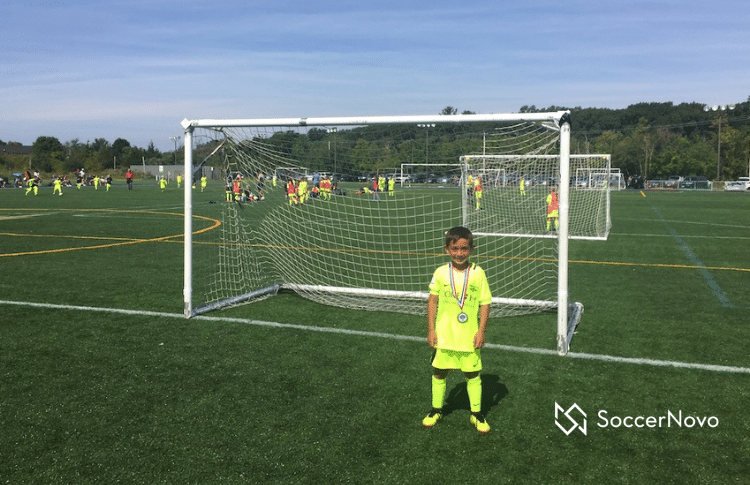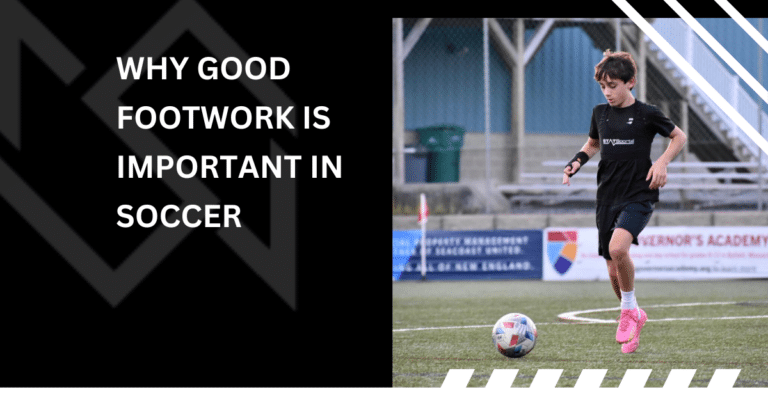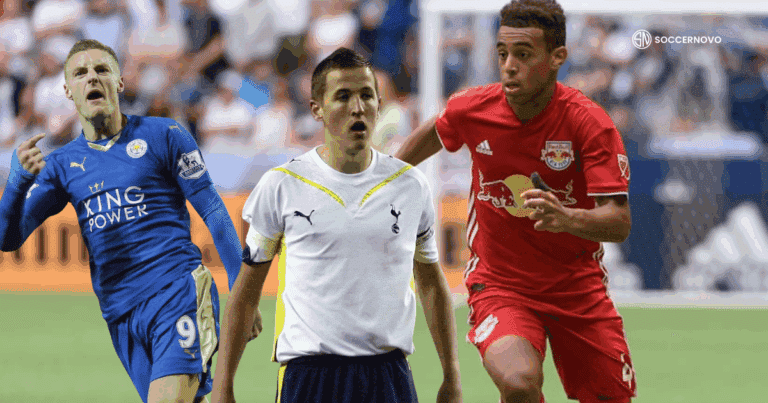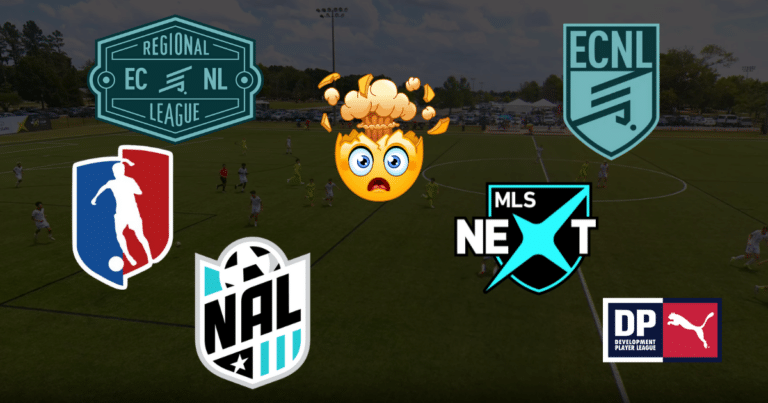Strive to be the Best (But Remember Soccer is a Game)

As a parent, it can be difficult to instill natural confidence in a child. This is especially true for kids playing sports.
There’s so many ups and downs that children face as they grow up. From a tough loss to a coach yelling at them and everything in between, soccer can take a toll on a child mentally. I know first-hand and I’ll explain later in this article about my experience growing up.
It’s our job, as parents and influencers, to help them navigate the wonderful journey of sports and life.
I have two sons. A 13-year old who plays for a local soccer club as part of the MLS NEXT league and a 7-year old who is playing town rec soccer. Both boys bring upon different challenges.
In this article, I hope to provide some insight on the things I do to try to instill confidence in them while holding the love they have for the sport of soccer.
The way I do it isn’t necessarily the right way but at least it provides a glimpse into another parent’s perspective.
Confidence is (Almost) Everything
For any athlete, I think having unwavering confidence is gold.
I’ve seen it at the youth and professional level. Players who have confidence in themselves perform at a higher level. It’s almost like a controllable super power.
Confidence, in my mind, is knowing that you are enough and are the best version of yourself. You can accomplish anything. You are the best player on the field. No questions asked.
Doubt – even just a small dose – is a confidence killer.
For me, I’ll tell my boys that they are the best (if they want to be). I’ll tell them that there’s things they control…like hustle…that will make them better players.
I’ll also tell them that they don’t want to peak next year. Instead, strive to peak in their 20s and 30s. I think this lifts the added pressure that sometimes comes with building confidence in a child.
8 Things That Help Instill Confidence in an Athlete
- Encourage effort over results: Emphasize the importance of trying their best and improving their skills, rather than focusing solely on winning or losing. This soccer journey can be a wild ride. Progress over perfection is key.
- Provide honest and positive feedback: Offer specific praise for their effort, attitude, and progress. This helps them feel appreciated and motivated to continue working hard.
- Set achievable goals: Work with your young athlete to set realistic and attainable goals. Celebrate their progress and success along the way. For example, establish goals at the beginning of the season such as scoring 3 goals.
- Focus on strengths: Help your child identify their strengths and encourage them to use them to their advantage in their sport. For example, my oldest is very shifty and I encourage him to use it to shake off defenders.
- Create a supportive environment: Ensure that your child feels supported and encouraged by their coaches, teammates, family members and friends.
- Teach resilience: Help your child understand that setbacks and failures are a normal part of sports and life. Encourage them to learn from their mistakes and keep moving forward.
- Teach accountability: Teach them to take full ownership of everything they do. By taking accountability, players are more in control. This will not only help on the field but off the field as well.
- Lead by example: Model confidence and resilience in your own life, and encourage your child to do the same. Take that extra promotion.
A Personal Story (of what not to do)
This is a bit personal but I hope it helps from a child’s perspective.
Growing up I was a very good athlete. I played basketball, soccer and baseball. Basketball and soccer being my primary sports.
I never like to toot my own horn but I was always one of the best players on the team. I was quick, fast and had a really good work rate.
I also had a very tough Dad. A dad who was physically and mentally abused growing up. A dad who didn’t have the same opportunities to play organized sports like I did. The combo of these two things wasn’t a great mixture.
I think in a way my Dad lived through me (with anger). Watching me play sports gave him the outlet and an opportunity to be tough on me.
And, tough he was. Not in an encouraging way either.
He would sit in silence watching my every move. I think he would quietly build a list in his head of the things I did wrong. A bad pass here and a missed shot there and a play that didn’t go my way everywhere.
That built up tension during the game would explode in the car. He would get in my face and berate me for the entire car ride home. He never hit me but he would sometimes raise his hand like he was going to. It made me feel like the sport was bigger than it was. He would suck the joy out of playing.
But, I always showed up. I would start tuning him out. It became part of the process.
It carried all the way through high school. On the outside I was a standout basketball player. On the inside, I was hurting for many years. This happened until I couldn’t take it anymore.
After one heated argument in my junior year of high school, my Dad and I got into a very heated argument. Then I decided it wasn’t worth it. I called my coach and told him “I quit.” He called me the next morning and convinced me to continue playing. My coach was there for me and provided the positive mentorship I hoped would come from my Dad all these years.
Our father-son relationship suffered as a result of all the years of being “tough”. As a kid in his teens, I made the decision that I’m better off without him in my life.
We carried on with our own lives and didn’t speak much to each other for the next decade. This continued as I got married and had kids. Every time I looked at him, I just saw the anger he had towards me as a child.
As I started getting older and having children of my own, I think he realized how obnoxiously hard he was on me. The perspective he had as a grandfather was different than a father. He made more of an effort to be my friend. But, it was too late…the damage was done.
Then, he sadly passed away.
Looking back, I’m not sure how worth it was. From my perspective, as a son, it wasn’t. All the yelling and screaming…for what? To ruin our relationship.
I regret not giving him a second chance but I was hurt. Hurt for so many years. Too many tears shed over things I enjoyed doing. I couldn’t find it in my heart to let it all go and forgive him. I wish I could and wish I had.
I hope my story will help those parents who may be overly tough on their kids. In the end, it’s sometimes not worth it and can have negative consequences for decades.
Remember: Soccer is Just a Game
Reminding your athlete that “soccer is just a game” is important. They need to know that it is not the end all.
Soccer should always be fun. There will be times when players are tested but if they are reminded that it’s a sport to be enjoyed then they can carry on with their lives.
As the player gets older, the pressure to win increases. The personal need to get better also heightens. It can feel like soccer is everything. However, it’s important to remember that at the end of the day, soccer is just a game.
Soccer is just one part of life, and there are many other things that are far more important, such as family, friends, health, and overall happiness.
As a parent, be there for your child. Be part of their journey. Share in the good and bad times with some humor. Have honest conversations about ways they can improve. Give them the confidence to be superhuman. Be their positive role model that they desperately need.
And, most of all, enjoy the beautiful game of soccer together!

Written By: SoccerNovo
SoccerNovo is an independent youth soccer media brand built to help parents, players, and coaches better understand the game and the pathways available in U.S. soccer. Our mission is to make youth soccer simpler, clearer, and more accessible for everyone involved in it.
Let’s connect







